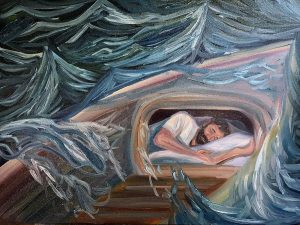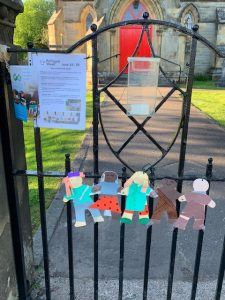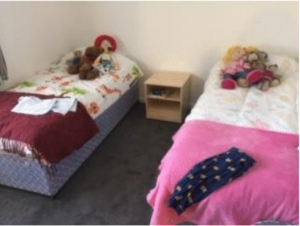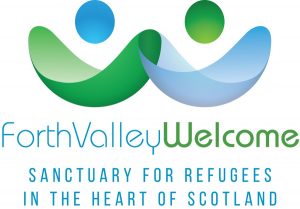
Nerys writes: Once you’ve lit your candle today, look around the room you’re sitting in. If you had to leave home in a hurry not knowing when you’d be back, I wonder what would you take with you? What would you leave behind?
No one wants to leave home but all over the world, people are forced to move because of danger. Every 2 seconds, a person is forced to flee for safety. Every day, 44,000 more people are driven from their homes. Most people don’t seek refuge in another country but every year up to a billion people cross a border and become asylum seekers, asking for protection as a refugee. Can you imagine what it’s like to arrive somewhere where everything is different from home, with no money, few possessions, no family, no friends? Can you imagine how lonely and frightened you might feel?
Our Gospel story today is set in a storm. As you read or listen to Mark 4.35-41, imagine what it was like for Jesus’ disciples. How might they have felt?
If it was you in that boat in the storm – with Jesus, your teacher, asleep, I wonder what would you have done, what would you have said to him?
According to Mark’s account, the disciples responded with the words, ‘Don’t you care that we’re in danger?’ A strange question but an important one to ask God and each other. Don’t you care about me? Don’t you care that I’m lonely and frightened?
It’s a question that the people of God have asked down the centuries. It’s a question the people of Israel sang about in their psalms.
How long, Lord? Will you forget me forever?
How long will you hide your face from me?
How long must I wrestle with my thoughts
and day after day have sorrow in my heart?
How long will my enemy triumph over me?
Look on me and answer, Lord my God. (Psalm 13.1-3)
 Sometimes it feels like nobody cares about us, nobody is listening. Everyone is busy with their own lives and it feels like God is asleep. At a time like this we need to call out to God like the psalmist did and like the disciples did in the boat. We do this because God has promised to be always with us, God is always listening. We do this because knowing that we’ve been heard makes a difference.
Sometimes it feels like nobody cares about us, nobody is listening. Everyone is busy with their own lives and it feels like God is asleep. At a time like this we need to call out to God like the psalmist did and like the disciples did in the boat. We do this because God has promised to be always with us, God is always listening. We do this because knowing that we’ve been heard makes a difference.
It can take away the fear. It can take away the loneliness. It can help us face the storm.
‘Why are you so afraid?’ Jesus was puzzled that his disciples had got into such a state. He was expecting them to trust in him, no matter what, and that’s what we’re called to do also.
Don’t you care that we’re in danger? Sometimes to people who have had to leave their homes, their families, their friends to become refugees, it seems that nobody cares about them. They call out but it seems that nobody is listening.
This is the last day of Refugee Week 2021. Some of us have been making people chains to remind us that ‘We cannot walk alone’.
Hugh Grant has been involved in Refugee Week in Dunblane but also volunteers with an organisation called Forth Valley Welcome.
I asked him, is there anybody out there caring for refugees?
 Yes, as you know, Forth Valley Welcome supports refugees who have come to Stirling and Clackmannanshire, up to 154 people now including 88 children. We have 75 volunteers, some of those go into the house or flat before people arrive and turn them into a nice homely space with cheerful bedspreads and curtains and toys for children.
Yes, as you know, Forth Valley Welcome supports refugees who have come to Stirling and Clackmannanshire, up to 154 people now including 88 children. We have 75 volunteers, some of those go into the house or flat before people arrive and turn them into a nice homely space with cheerful bedspreads and curtains and toys for children.
Some volunteers are assigned as befrienders to families, visit them regularly, especially at the beginning, help them get to know the area, the shops, the buses, and practice speaking in English. As they become settled in the area, we introduce them to local community organisations.
Pre-Covid we used to run a ‘Snack and Chat’ every six weeks or so people could come together and meet each other and volunteers, and again practice their English. Over the last year, when we’ve not been able to visit families, we’ve provided occasional food deliveries, especially at Eid and Christmas, and run online competitions through our WhatsApp group.
There are groups like us around the UK. Other organisations who help are the Scottish Refugee Council, who provide advice and support to refugees and to asylum seekers who are still in the process of being assessed by the Home Office as to whether they will be allowed to stay in the UK. Positive Action in Housing in Glasgow helps with people like asylum-seekers who end up on the streets if their claims to stay are not successful, and some individuals take people into their homes. Stirling’s Aid4All provides food packages and other items for people in one of the camps that is not run by UNHCR. And there are people who go to provide voluntary support to people in the unofficial camps in Calais, and in Lesbos island in Greece.
In what way can we show our care?
All of us can try to understand better the situation of refugees and asylum-seekers. The media often highlight extreme cases, not always in a sympathetic light, so we can try to keep a clear mind about the whole picture.
If we’re out shopping in Stirling or elsewhere and see people who might be refugees, people different from us, we can smile and say hello and let people feel welcome.
Some people in Dunblane are volunteers, or have been in the past, visiting families and helping in other ways. Some give donations to Forth Valley Welcome and other organisations. We have a store that’s been provided to us free in Dunblane where we keep clothes, toys, and other items but we have quite a lot in there at the moment, more than we need for now, but from time to time there’s a need for items and we can let you know about those requests when they arise.
Our Men’s Group have been discussing what we might do as a church, perhaps welcoming some here from time to time so that we can get to know some of the people affected.
There’s an organisation called Scottish Faiths Action for Refugees which provides a network for people of all faiths on the issue. They have a study course available that was produced by CBTI (Churches Together in Britain and Ireland). We could think about using that course in future.
We can pray together about refugees, their situation, the reasons why they have to flee from their homes, asking for God‘s love to be present to all – the refugees and asylum-seekers themselves, and those who work to help them.
After you have reflected on Hugh’s words, you are invited to read the words of a new hymn by Martin Pratt and use it perhaps as a prayer of confession and commitment. Here is David Sawyer playing the tune.
There are no strangers to God’s love,
yet we have privatised God’s grace.
Bounded by nationhood and lies,
in fear we shrouded love’s own face.
Acknowledging our sin and greed we come
confessing common need.
These are our neighbours and our friends,
the ones who run in fear from war,
who read abuse by power or state,
or seek the means to be less poor;
these are the ones we have denied,
as in each one the Christ has cried.
When people seeking sanctuary come
to our shores and need our aid,
then in Christ’s name let’s offer care
through this our debt of love is paid.
God’s grace is free, this grace receive,
let actions show what we believe.
Martin Wisher who is a board member for Forth Valley Welcome, invites us to join him in the following prayers of intercession:
Heavenly Father as we come to you in prayer we lament that in this world of plenty and in this age of ‘civilization’ so many of our fellow human beings have been forced as refugees to flee from their homes and countries, leaving possessions, family and friends because of wars, persecution, poverty and climate change. Children are separated from family and friend and make perilous journeys to try to reach safety. We cry out to the God who executes justice for the orphan and the widow and who loves the stranger.
We pray for those individuals and organizations seeking to provide refuge, to alleviate suffering and to bring justice for refugees and asylum seekers. We ask that your Holy Spirit empower this ministry and bring love, peace and justice out of suffering.
We pray for those in authority and particularly our UK government as it administers care to refugees and asylum seekers. We pray that there would be more compassion shown and that resources would increase to positively affect this refugee crisis.
We pray for the Church worldwide and at St Mary’s locally. May we be empowered by your Holy Spirit to find ways to care for refugees and asylum seekers and to effectively represent their needs to our society.
We pray for those known to us who are ill, those mourning the loss of a loved one..
We pray for those dealing with stress, financial concerns, the loss of their job, loneliness and depression caused by the COVID pandemic.
We pray for ourselves that we may love you with all our heart, soul, mind and strength and love our neighbour, the refugee, as ourselves.
We finish our time of prayer with the well-known hymn, ‘Brother, sister, let me serve you’ which reminds us on our dependence on God and on one another. Here is David playing the tune.
Brother, sister, let me serve you,
Let me be as Christ to you;
Pray that I may have the grace to
Let you be my servant, too.
We are pilgrims on a journey,
And companions on the road;
We are here to help each other
Walk the mile and bear the load.
I will hold the Christ-light for you
In the night-time of your fear;
I will hold my hand out to you,
Speak the peace you long to hear.
I will weep when you are weeping,
When you laugh I’ll laugh with you;
I will share your joy and sorrow
Till we’ve seen this journey through.
When we sing to God in heaven
We shall find such harmony
Born of all we’ve known together
Of Christ’s love and agony.
Brother, sister, let me serve you,
Let me be as Christ to you;
Pray that I may have the grace to
Let you be my servant, too.
Richard Gillard






